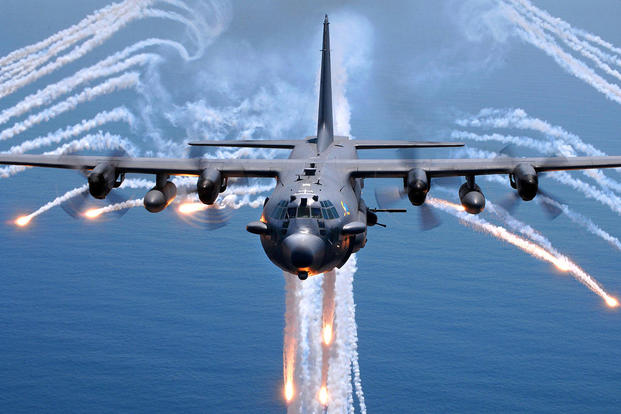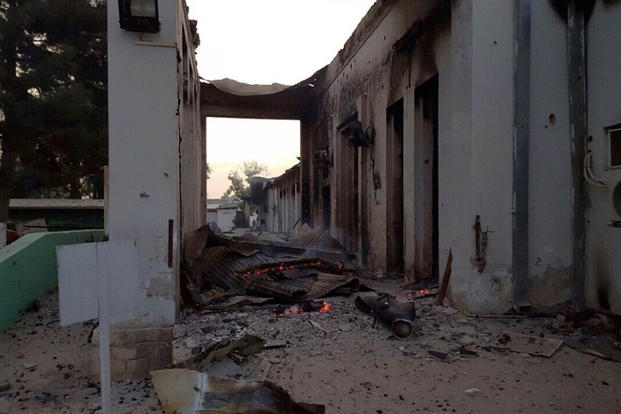An Air Force AC-130 Special Operations Command gunship may have carried out the strike in Afghanistan that allegedly hit a Doctors Without Borders hospital in the embattled northern city of Kunduz, killing at least 22, including 12 staffers.
Defense Secretary Ashton Carter, who was traveling in Europe to NATO meetings, called the attack a "tragic incident" but stopped short of an apology.
Carter and U.S. military officials in Afghanistan and the Pentagon have yet to specify the type of aircraft that carried out the airstrike but the Washington Post, CNN and other news outlets cited a U.S. official in Afghanistan as saying that it was a ground attack AC-130.
In a statement Sunday, Doctors Without Borders (Medicins Sans Frontieres, or MSF) said the hospital was being closed and its staff withdrawn because of the ongoing fighting in Kunduz between the Taliban and the Afghan National Security Forces, leaving residents of the city of 300,000 more at risk.
"No medical activities are possible now in the MSF hospital in Kunduz, at a time when the medical needs are immense," said Tim Shenk, a New York-based spokesman for the Nobel Peace Prize-winning organization.
In statements and in numerous news interviews, MSF has said that the air attack was sustained for more than an hour, from 2:08 a.m. to 3:15 a.m. Saturday local time.
The MSF officials said that the attack continued despite pleas to the U.S. military to call it off and despite having previously made known the hospital's GPS coordinates.
The Lockheed AC-130 was designed to provide close air support for troops under fire and can linger over targets, making "pylon turns" overhead to prolong an attack.
"The bombs hit and then we heard the plane circle round," said Heman Nagarathnam, MSF head of programs in northern Afghanistan. "There was a pause, and then more bombs hit. This happened again and again. When I made it out from the office, the main hospital building was engulfed in flames."
"Those people that could had moved quickly to the building's two bunkers to seek safety but patients who were unable to escape burned to death as they lay in their beds," he said.
One model of the AC-130 - the AC-130H Spectre - carries a 105mm M102 howitzer and a 40 mm L/60 Bofors cannon. Other versions - the AC-130W Stinger II and AC-130J -- can carry AGM-176 Griffin missiles and GBU-53/B SDB II small diameter precision bombs.
In a statement Sunday, MSF said that "Under the clear presumption that a war crime has been committed, MSF demands that a full and transparent investigation into the event be conducted by an independent international body."
In its only statement thus far on the incident, U.S. Forces-Afghanistan confirmed that an airstrike was conducted in Kunduz at abou5 2:15 a.m. Saturday morning against Taliban "insurgents who were directly firing upon U.S. servicemembers advising and assisting Afghan Security Forces. The strike was conducted in the vicinity of a Doctors Without Borders medical facility."
The statement said that NATO's Operation Resolute Support "has directed a preliminary multi-national investigation known as a Casualty Assessment Team. We anticipate having the results of this initial assessment in a matter of days. Additionally, the U.S. military has opened a formal investigation headed by a general officer to conduct a thorough and comprehensive inquiry."
MSF said the U.S. military response was totally inadequate and again denied that any firing from the hospital had taken place.
"Relying only on an internal investigation by a party to the conflict would be wholly insufficient," MSF said. "Not a single member of our staff reported any fighting inside the MSF hospital compound prior to the U.S. airstrike on Saturday morning."
"This attack is abhorrent and a grave violation of International Humanitarian Law," said Meinie Nicolai, MSF President. "We cannot accept that this horrific loss of life will simply be dismissed as 'collateral damage.'"
MSF said the hospital had treated more than 390 people wounded in the fighting that began last Monday when the Taliban swept through Kunduz, a city of about 300,000 and the provincial capital of Kunduz province.
The Afghan National Security Forces, backed in the area by U.S. Special Operations trainers and advisers and some German troops, have since mounted counter-attacks to retake the city.
MSF said that the hospital "was full of MSF staff, patients and their caretakers" at the time of the attack which killed 12 MSF staff members and ten patients, including three children.
"We reiterate that the main hospital building, where medical personnel were caring for patients, was repeatedly and very precisely hit during each aerial raid, while the rest of the compound was left mostly untouched," MSF said.
In a statement, Army Gen. John Campbell, commander of U.S. and coalition forces in Afghanistan, said that "While we work to thoroughly examine the incident and determine what happened, my thoughts and prayers are with those affected."
"We continue to advise and assist our Afghan partners as they clear the city of Kunduz and surrounding areas of insurgents. As always, we will take all reasonable steps to protect civilians from harm," Campbell said.
Richard Sisk can be reached at Richard.Sisk@military.com.





























